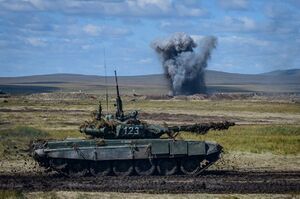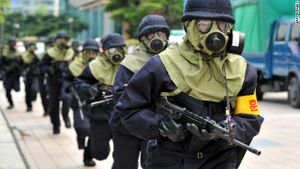Xisheng Front
This article is a work-in-progress because it is incomplete and pending further input from an author. Note: The contents of this article are not considered canonical and may be inaccurate. Please comment on this article's talk page to share your input, comments and questions. |
| Xisheng front | |||||||
|---|---|---|---|---|---|---|---|
| Part of the Final War of the Deluge | |||||||
 Daxian Army tank during a skirmish, 2022 | |||||||
| |||||||
| Belligerents | |||||||
|
|
| ||||||
| Commanders and leaders | |||||||
| File:Flag of the Upper Skagit Indian Tribe of Washington.PNGShai Malan-Zar |
File:Daxia Flag.jpgBort Borg File:Daxia Flag.jpgArik Mung | ||||||
| Units involved | |||||||
| Northern Command |
Army of Conquest | ||||||
| Strength | |||||||
|
2,600,000+ (2022) |
2,250,000+ (2022) | ||||||
| Casualties and losses | |||||||
| High | High | ||||||
The Xisheng Front is a theater of operations during the Final War of the Deluge being fought in Xisheng and northern Varshan by the forces of the Democratic Republic of Daxia and the Worshipful Realm of Varshan. The front was initially opened to relieve pressure from Urcean Cetsencalia and saw a build-up of hundreds of thousands of troops and the taking and retaking of ground on both sides of the border. This front saw the first use of chemical weapons in the wider conflict.
Background
The start of hostilities between Daxia and Varshan can be pointed to a border delimitation dispute between both nations following the fall of Nanzitolclatl. Both nations began a policy of aggressive military build-up and posturing on the disputed border, including several clashes that resulted in deaths from the two sides. As Urcea and its dependencies were dragged into a shooting war with Varshan, forcing the latter to withdraw numerous units from the Xisheng frontier region, the Daxian commited to an opportunistic attack to settle the border issue by force.
Summary of operations
Initial moves
Even with the shift in resources to Cetsencalia, Daxian forces were still numerically inferior to their Varshani counterparts. A large portion of Daxian strength in Crona represented in the main body of the Army of Conquest was still engaged north in a simmering conflict with the Alpachnee Confederation. Daxian command believed its air assets on hand, partial element of surprise and the qualitative edge of its forces would be enough to nullify the Varshani advantage in numbers.
On May 25, 2021, Daxian artillery alongside drones began an intensive bombardment of Varshan positions south of the Amox river. By May 29, Daxian forces had constructed several pontoon bridges and were crossing over the Amox into Varshan proper. Pushing back light counter-attacks, the 3rd and 18th Mechanized divisions aided by Green Army jungle detachments and drone sorties, secured several bridgeheads allowing Daxian forces to continue pouring across. Initially unable to hold back the Daxian advance, Varshan's Northern zone commander Shai Malan-Zar adopted a strategy of defense in depth, quickly ordering his forces to fall back to four prepared defensive lines north of Shimrra while calling reserves from the interior.
Varshan counteroffensive

As Varshan's invasion of Cetsencalia found increased battlefield gains, Varshan command saw fit to transfer back fifty divisions to the Xisheng front, where the Daxian offensive was bogged down forty five km north of Shimrra. The sudden influx of battle hardened reinforcements saw the reversal of the limited Daxian gains within weeks, forcing them back to the Amox river, and then forcing them to conduct a hasty fighting retreat back across it. These setbacks forced field marshal Bort Borg to finally recall the bulk of the Army of Conquest from the north in order to salvage the worsening situation and stabilize the front. With local superiority Varshan forces successfully crossed the Amox after several abortive and costly landing attempts and began capturing several towns and strongpoints while Daxian forces only put up desultory resistance before retreating to avoid being destroyed in pitched battle by overwhelming Varshani numbers. In a matter of weeks the Daxian army lost the towns of Khaw, Hong Guo, Mian, Baiga, Shul, Cheshen, Waguo, Chongzi and Anqi alongside most of the border fortifications. Daxian forces repositioned alongside the Wajj-Gouda-Sard defensive axis to try and prevent a Varshani breakthrough. Varshan conducted pinning attacks on the towns of Wajj and Sard while pushing towards the transport hub of Gouda. This attack marked the high point of Varshan's offensive inside Xisheng and was the furthest it managed to advance into Daxian territory.
The initial Varshani attempt to capture the centrally located town of Gouda saw them overrun the defenders and take almost 80% of the city, leaving the Daxian only in control of the northern industrial district and the airport. A higher tempo of drone sorties and the first massive use of chemical weapons in the war managed to stop the city from falling completely. Deployed by the Army of Conquest through rockets, sarin and chlorine gas attacks led to thousands of Varshani soldiers suffocating in the southernmost districts of Gouda. Brutal urban combat raged in Gouda for two months as both sides fought over every street, sewer and ruined building. Most of the ethnic Daxian had been previously evacuated, but the Cronan inhabitants were left to fend for themselves during the battle, resulting in thousands of casualties at the hands of both armies. Continued chemical attacks, unmanned drone attacks on supply depots and the grinding of their forces by artillery pushed the Varshani command to retreat from Gouda and order their forces south towards Waguo. The heavy losses incurred in Gouda brought the Varshani counteroffensive to a halt, as depleted units were forced to abandon their positions and be removed from the front to be replenished and refitted.
Turnaround
Aftermath